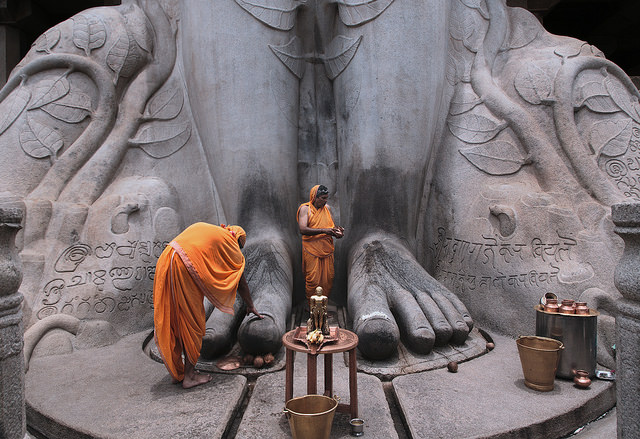
Millennials Give Up All Possessions to Become Jain Monks
- By C Barnett --
- 10 Mar 2018 --

16 men and women participate in ceremony to transform into their new ascetic identity
A Diksha ceremony was recently held in Mumbai in which 16 men and women took the Jain Vow of renunciation. The ceremony was held at the Shimpoli Cricket Ground in Borivali, Mumbai. These successful individuals, aged between 14 and 45, ten under age 30, gave up all their worldly possessions for a life of severe hardship, that of Jain asceticism.
Millennials Give Up All Possessions to Become Jain Monks[/tweetthis]
The ceremony sees the attendance of thousands of members of the Jain community such as Hemant Shah, a 64-year-old newly retired businessman from Canada who works closely with the presiding guru of the ceremony, Acharya Yugbhushan Suri Maharaj (known as Pandit Maharaj). Families and friends were also in attendance to see their loved ones ceremoniously become diksharthis, monks and nuns of Jainism.
The ceremony kicked off with the closest kin taking all possessions such as jewelry from the renunciants. The final ceremonial rites were performed by the kin and entailed shaving and showering their loved one for the last time, as from then on they would only sponge-bathe.
After this, the dikshar returned to the stage where they were received with joy by the audience. With their shaved heads and white clothing, the sixteen took their vows of renunciation and assumed their new identities. They were presented with new belongings for their new life – a walking stick, a bowl, and a white square cloth to sit on. The Pandit Maharaj gave every dikshar a new title, marking a new beginning and identity. The Jain monks and nuns would travel across cities on foot except in monsoon months, pluck their hair out strand-by-strand (an agonizing exercise called kaya klesh), and scavenge for food.
The millennial Jain monks and nuns have joined the journey of a community of an estimated 16,000 Jain ascetics. They now live on five basic vows (mahavratas): detachment (aparigraha), celibacy (brahmacharya), not stealing (achaurya), truth (satya), and non-violence (ahimsa). They will not hold bank accounts but will be catered for by the Jain community through the organization Jain International Trade Organization (JITO).



















